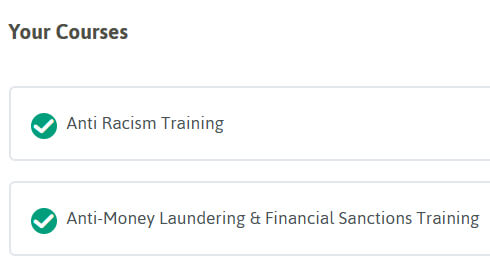Anti-Money Laundering & Financial Sanctions v5.2 – for Members of the Bar
Already enrolled on the course? Please login to access.
Who is this training designed for?
This course offers an overview of the law and procedure concerning the Money Laundering, Terrorist Financing and Transfer of Funds (Information on the Payer) Regulations 2017 (“MLR”) as well as the UK sanctions regime.
This training course is designed for:
- Members of the independent Bar practising from Chambers
- First and Second Six Month pupils
- Senior Chambers support staff
Lawyers and Chambers are at risk of unwittingly becoming involved in money laundering and/or the breach of sanctions. Lawyers who fall into such misconduct are at risk of criminal or regulatory proceedings with severe consequences.
This training is mostly applicable to lawyers but will also be a useful learning tool for staff occupying senior positions in Chambers.
Why is this training important?
Recently, in the space of six-months, the Solicitors Disciplinary Tribunal (‘SDT’) fined two different firms and their directors a total of £63,000 for their failures to comply with their obligations under the Money Laundering Regulations. During the investigation process, the SDT considered 15 client files and their compliance with the regulations. It was discovered that 12 of those client files had AML compliance issues with three involving funds from China and one file where the source of funds was uncertain but the firm had failed to make any enquiry into the source of the funds.
Lawyers are likely to face a panoply of risks, with diverse caseloads presenting possible concerns including payments, client identification, tax consequences, and cases involving different financial instruments and supply chains. The legal sector must be alive to these issues with systems in place to ensure compliance and to avoid penalisation. Accordingly, this training course is designed to equip barristers and chambers’ staff with the necessary information to be able to adequately identify, prevent and report money laundering issues. Furthermore, it will help barristers and chambers’ staff to understand the legal framework behind the regulations and protect themselves and their business from becoming victims of financial crime.
Understanding the application of and compliance with the Money Laundering and Terrorist Financing Regulations (MLTF 2017) should be a high priority for Barristers and the legal profession as a whole.
Whilst this training is not compulsory, it is best practice for Barristers to be fully understanding of their obligations under their regulations to ensure compliance and avoid regulatory and potentially criminal sanctions.
About this training module
The Anti-Money Laundering and Financial Sanctions training course was originally written jointly by Jake Taylor of Doughty Street Chambers and Christopher Sykes of 33 Chancery Lane in 2022 and updated as and when necessary following this, before being updated and rewritten by Alejandra Llorente Tascon of 5 KBW in August 2025.
About the Authors

Alejandra Llorente Tascon 2016 call
Alejandra Llorente Tascon is a barrister at Mountford Chambers who specialises in criminal and military law, She is a respected jury advocate who manages complex and sensitive legal cases, with experience on both the prosecution and defence sides.
She is recognized as a Leading Junior (Tier 4) in The Legal 500 and regularly takes on the role of sole counsel or leading junior in major, multifaceted cases. Her work spans a wide range of serious criminal matters in both the Crown Court and the Court of Appeal.

Jake Taylor 2012 call
Jake is a specialise defence barrister at Doughty Street Chambers. He is leading counsel appearing in heavyweight and complex criminal cases, particularly those matters that have an international dimension. He also advises on sanctions, cross-border investigations, inquests and extradition requests.
He was previously appointed by the Cayman Islands government to lead investigations and prosecutions of international corruption and cross-border money laundering in a leading international financial centre, and has previously advised the Foreign Commonwealth and Development Office on the Russian sanctions regime.
Jake combines practice with his judicial role sitting as an Assistant Coroner at the Westminster Coroner’s Court hearing inquests and as a member of the adjunct staff on the Transnational and International Criminal Law course at the University of Amsterdam.

Christopher Sykes 2015 call
Christopher specialises in financial crime, confiscation, and professional discipline at 33 Chancery Lane and is Panel C counsel for the Serious Fraud Office, and also acts for authorities and individuals in civil and criminal matters concerning the proceeds of crime.
He has particular expertise in matters concerning the freezing, detention and forfeiture of cash, crypto assets and bank accounts. Christopher represents both prosecution and defence in criminal proceedings arising from fraud and financial crime and has acted as junior counsel and disclosure counsel in complex FCA prosecutions.
Christopher regularly appears for the Council for Licensed Conveyancers in proceedings concerning breach of money laundering regulations.







